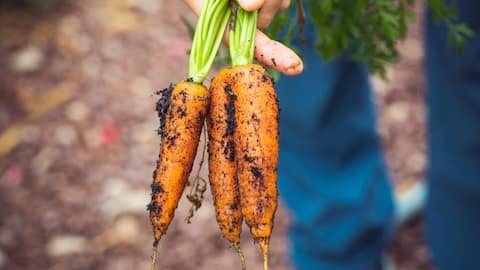Vegetables that you can grow in your garden this winter
What's the story
As the temperatures lower in the Indian climate, the winter garden transforms into a vibrant tapestry adorned with robust veggies and greens. Contrary to common belief, winter isn't a dormant season for gardening here. It's an opportune time to cultivate an array of vegetables that thrive in the crisp, cold air. Below are some vegetables that are suitable to grow in winter.
Vegetable 1
Carrots
Generally, carrots grown in your gardens are far sweeter than those from the market. Regarding their need for sunlight and water, carrot seeds are quite pliable. Carrots can produce an optimal yield in as little as 50 to 75 days with just an inch of water per week and roughly six to eight hours of sunlight per day.
Vegetable 2
Cauliflowers
Cauliflowers are another ideal winter vegetable. Grow them in an area with plenty of direct sunlight and make sure the soil stays moist. They can survive with very little water. Cauliflower seeds can yield fresh vegetables in 55 to 100 days with as little as two inches of water per week and six to eight hours of sunlight each day.
Vegetable 3
Beetroot
Beets prefer full sun, although they can withstand frost and temperatures close to freezing. Given their subterranean growth, these vegetables require ample soil to flourish. Their roots can endure temperature drops. For optimal growth, ensure well-drained soil and choose pots with proper drainage holes. Position the plant to receive six to eight hours of direct sunlight daily.
Vegetable 4
Cabbages
Winter-ripened cabbage is sweeter than summer-ripened cabbage because of its resistance to cooler temperatures. Add compost to a garden bed to create fertile, well-draining soil. After sowing the seeds, cover them with 1/4 inch of soil and maintain uniform moisture content in the soil. However, you will need patience to grow them since winter cabbages grow slowly.
Vegetable 5
Radishes
Radishes are resilient. They can thrive even in winter gardens with temperatures as low as -3°C. Besides, radishes are an excellent vegetable to harvest quickly and easily with little work. If the soil is kept moist throughout the growth cycle and receives at least six hours of sunlight daily, fresh radish seeds should be available for consumption in 25 to 45 days.
